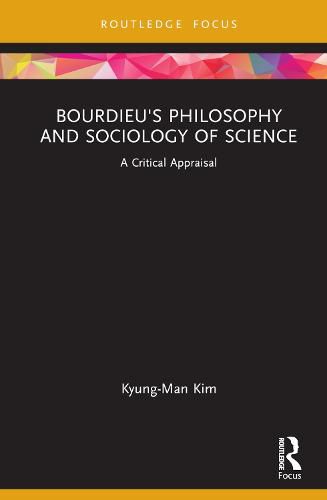Readings Newsletter
Become a Readings Member to make your shopping experience even easier.
Sign in or sign up for free!
You’re not far away from qualifying for FREE standard shipping within Australia
You’ve qualified for FREE standard shipping within Australia
The cart is loading…






This book explores Pierre Bourdieu’s philosophy and sociology of science, which, though central to his thought, have been largely neglected in critical examinations of his work.
Addressing the resultant confusion that surrounds Bourdieu’s sociologized philosophy of science, it expounds his epistemology and sociology of science, situating it within the context of Anglo-American post positivist philosophy of science and shedding light on the critique of relativist sociology of science that emerges from his field theory. From a detailed critique of Bourdieu’s reflexive sociology and his attempt to enhance the uneasy epistemic status of the social sciences, the author draws on the thought of Jurgen Habermas to suggest critical ethnography as a way of going beyond Bourdieu’s critical theory.
As such, Bourdieu’s Philosophy and Sociology of Science will appeal to sociologists, philosophers and scholars across the social sciences with interests in the work of Bourdieu and the sociology and philosophy of science.
$9.00 standard shipping within Australia
FREE standard shipping within Australia for orders over $100.00
Express & International shipping calculated at checkout
This book explores Pierre Bourdieu’s philosophy and sociology of science, which, though central to his thought, have been largely neglected in critical examinations of his work.
Addressing the resultant confusion that surrounds Bourdieu’s sociologized philosophy of science, it expounds his epistemology and sociology of science, situating it within the context of Anglo-American post positivist philosophy of science and shedding light on the critique of relativist sociology of science that emerges from his field theory. From a detailed critique of Bourdieu’s reflexive sociology and his attempt to enhance the uneasy epistemic status of the social sciences, the author draws on the thought of Jurgen Habermas to suggest critical ethnography as a way of going beyond Bourdieu’s critical theory.
As such, Bourdieu’s Philosophy and Sociology of Science will appeal to sociologists, philosophers and scholars across the social sciences with interests in the work of Bourdieu and the sociology and philosophy of science.